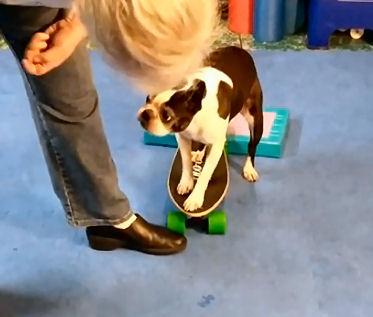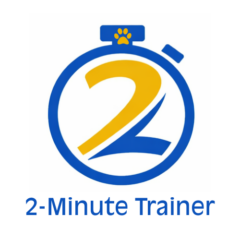Afraid of doing it wrong? You don’t have to be. Dogs don’t judge.
Some people are reluctant to try new things. Especially if they’re in a public place, or if they’re being watched. We see it in our dog training classes all the time. We have to encourage people to be louder, more active, keep trying, talk to their dogs, etc. Because we’re all afraid of being judged.
Dogs don’t judge
One of the best, and most fun, things about 2-Minute dog games is that there’s never a buzzer or anyone yelling “wrong!” You can play and adapt every game to where you and your dog are right at that moment. And dogs don’t shut down or quit – they’re encouraged to keep trying.
“Try again!” is a phrase that makes our dogs wiggle their butts – it means they get to keep playing. That particular attempt may not have been rewarded, but they get to keep playing and discover what does get the cookie.
You can’t “break” your dog
Positive reinforcement training will never “break” your dog. We have seen dog victims of harsh methods who may never recover to become normal dogs. That doesn’t happen with training games. The “worst” consequences for the dog is not getting a treat. And another opportunity to try.
You also don’t have to worry about getting things right every time. Just like our dogs, we have another chance to play and try again.
This week we’re playing a new game with our dogs. We’ve seen videos of dogs riding skateboards and thought it looked pretty fun. So we got our dog a skateboard!
See what they think
Whenever we introduce a new training tool (toy!) to our dogs, we take the first session or two to see what they think of it. If it’s something that’s familiar, the introduction doesn’t take long and we can start a new game behavior quickly. If it’s something as alien as a skateboard, we want to see how the dogs react before we formulate a game strategy. That’s exactly how we start even the very first dog training game, “Boxey.”
Each of Fran’s dogs reacted a bit differently:

Booker (8-year-old Boston Terrier) dashed right over, put multiple paws on the deck, and wasn’t fazed in the least when it started moving. His game will emphasize putting three paws on, then moving it with purpose.
Tango (12-year-old Brussels Griffon) doesn’t see too well at this point, but is so familiar with training games that when he noticed something new in the space, he went over to it. He sniffed it, got paws up on it, and was clearly willing to play.
Simon (2-year-old Boston) ran over to the skateboard and was in constant motion. “You want this?” “How about this?” “I’ll try this!” “One paw good?” “Three paws?” “What about shoving it across the room?”
Clearly none of them was afraid of the item itself, or its movement. And we’ll play games tailored to each dog. Booker’s game will work on refining technique. Tango will probably learn “go for a ride” with us moving the board. Simon’s game will focus on focus. That pup is smart as can be, but still has the attention span of a puppy Boston.
Dogs just want to have fun
We didn’t worry about doing something “wrong.” The dogs got to “meet” their new toy, and we were able to get an idea of each dog’s training game. The next time the dogs see the skateboard, we’ll have a plan for each one – what action will get a “click and treat,” and which one will be ignored.
The plan doesn’t always happen. Because they’re dogs. That’s okay. We don’t have to be perfect, and neither do the dogs.
You don’t have to worry about getting things “wrong” in a dog training game. Dogs trained with positive reinforcement games will keep trying, keep exploring. Rewards are great, but most dogs adore playing the game. Most will keep trying, just because playing with you is fun.
And if you click at the wrong time? Just give your dog the cookie and try again. Nobody’s perfect and your dog will forgive you. Your mistake may confuse your dog for a minute, but that’s okay. Nobody got hurt. Nobody saw. Dogs are adaptable. Dogs don’t judge. And your dog loves playing with you.
